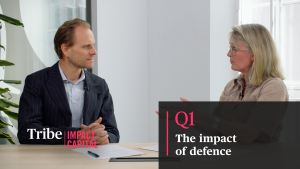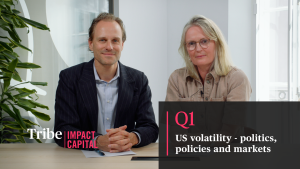CIO conversations - Q3 2023

Catch up with our CIOs, Amy Clarke and Fred Kooij, as they discuss the latest developments in investment and impact in their quarterly update.
In Q3 2023, markets adjusted as inflation cooled slightly in developed economies, though interest rate concerns and rising oil prices affected shares and bonds. Clean energy stocks faced challenges due to higher costs and supply chain issues, but the sector remains strong in the long term.
The UK’s shift on net-zero timelines sparked fresh discussions on sustainable growth. Global climate action also gained momentum as young people took legal action, including a case against 32 countries for climate inaction.
Meanwhile, the International Energy Agency reported positive progress, with solar and electric vehicle sales on track for net-zero goals. Record summer heat and extreme weather highlighted the urgent need to push forward with climate action.





